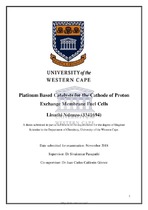Platinum based catalysts for the cathode of proton exchange membrane fuel cells
Abstract
Oxygen reduction reaction (ORR) is carried out in the cathode of the proton exchange membrane fuel cell (PEMFC) and it is known for its sluggish kinetics and the existence of two-pathway mechanism, related with the production of water and hydrogen peroxide. Nowadays, the design of novel cathode catalysts that are able to generate both high oxygen reduction currents and water as main product is a challenge since it causes an enhancement in the performance of PEMFC. Generally, these catalysts are composed of platinum nanoparticles, bearing in mind its high activity towards the ORR. However, the use of platinum means an increase in the total cost of PEMFCs due to its scarcity and high cost. This topic has been the motivation for a wide research in the field of PEMFCs during the last several years, being the main goal to design efficient and low cost catalysts for the cathode of PEMFCs. In this Master thesis project, platinum-palladium (Pt-Pd) catalysts supported on carbon black (CB), carbon nanofibers (CNF) and carbon xerogels (CX) were synthesised using methanol (MeOH), formaldehyde (FMY), n-propanol (nPrOH), ethanol (EtOH) and ascorbic acid (AA). The as-prepared materials were physically characterised by energy dispersive X-ray (EDS), X-ray diffraction (XRD) and transmission electronic microscopy (TEM), in order to determine its composition and morphological characteristics. The catalytic activity towards ORR was assessed by means of electrochemical techniques as rotating disc electrode (RDE) and cyclic voltammetry (CV).

